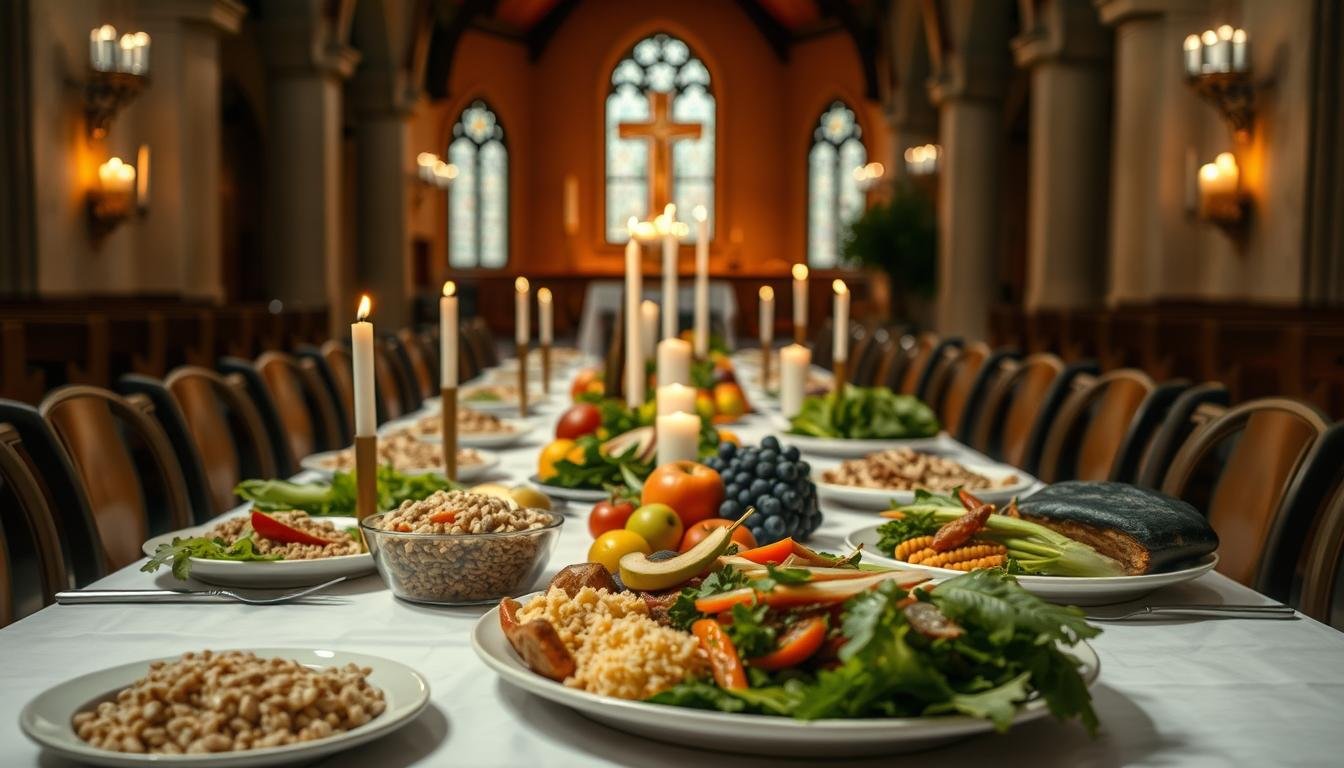Many Christians wonder if it’s okay to eat meat on Friday, especially during Lent. The idea of not eating meat is important in many Christian groups. But, opinions on this topic vary a lot. This piece will look into the history and current views on not eating meat during Lent and on Fridays. It will also explore the rules about eating meat.
Understanding the Tradition of Abstaining from Meat
The tradition of not eating meat is very important in the Christian faith, especially during Lent. It’s a way to show remorse and think deeply about one’s faith. By not eating meat on Fridays, many Christians add a spiritual touch to their fasting.
This custom started in the early days of the Church. It was seen as a way to be spiritual and to deny oneself. It connects fasting to a spiritual path, making Lent more meaningful.
Over time, how people see and do meat abstinence has changed. But its core message stays the same. It’s about faith, giving up something, and the strength that comes from discipline. Today, many Christians still follow this tradition to deeply experience Lent and fasting.
Historical Context of Meat Abstinence in Christianity
The history of meat abstinence in Christianity goes way back. It started as a key part of early Church practices. Fasting was a way to prepare spiritually. Not eating meat was a sign of penance and a time for deep thought, especially before big religious events.
Fasting has been part of the early Church, as seen in many texts. The Didache, an early Christian guide, talks about fasting days. It says believers should fast on Wednesdays and Fridays. This made not eating meat a sign of devotion.
During Lent, meat abstinence becomes even more important. It reflects on Jesus’ life and is for getting ready for Easter and remembering Christ’s suffering. This shows why many Christians still don’t eat meat today, keeping their faith alive with old Church rituals.

Can Christians Eat Meat On Friday?
Meat on Fridays has been a topic of thought in Christian beliefs for a long time. In the Catholic faith, not eating meat on Fridays is a big part of tradition. This tradition comes from the belief that Friday is the day Jesus was crucified. It’s seen as a day of penance.
But, how people follow this tradition varies a lot among different Christian groups. Some stick to not eating meat on Fridays, while others don’t follow it as closely. There’s no clear rule in the Bible about not eating meat on Fridays, which leads to different opinions on what’s okay.
This variety shows the wide range of beliefs within Christianity. As Christians think about their own views of the Lenten season, deciding what to eat on Friday sparks talks about faith, self-control, and personal choices.
The Significance of Fridays in the Christian Calendar
Fridays are very important in the Christian calendar. They remind us of key events in Christianity. This day is for remembering Christ’s passion, reflecting, and growing spiritually.
Christians observe Fridays by fasting. This deepens their faith and understanding of Jesus’ sacrifice.
Theological Importance of Good Friday
Good Friday is a crucial day in the Christian calendar. It marks the crucifixion of Jesus. This day teaches us about sacrifice, redemption, and deep thought.
It encourages believers to fast. This helps them think about Christ’s suffering for us. By fasting, Christians show their faith and the message of love and forgiveness.
Historical Fasting Practices on Fridays
Fasting on Fridays has a long history. It started as a way to honor important events and show penitence. Early Christians stopped eating meat and other rich foods.
This showed the importance of Fridays, especially during Lent. Today, Christians keep these traditions alive. They connect with centuries of faith and show the value of sacrifice and reflection in their lives.

Different Denominational Practices Regarding Meat Consumption
Christian groups have their own ways of handling meat on Fridays. The rules they follow can tell us a lot about their traditions and values.
Catholicism and the Tradition of Meatless Fridays
The Catholic Church asks people to not eat meat on Fridays, especially during Lent. This tradition is old and helps people think about their actions and their faith. It connects them to Jesus Christ’s sacrifice, deepening their faith.
Orthodox Practices and Their Significance
In Orthodox Christianity, fasting is a big deal. They have strict rules about what to eat all year. Fridays are often a day of strict fasting, especially during important church times. These rules help people grow spiritually and stay true to their traditions.
Lutheran and Anglican Guidelines
Lutheran and Anglican groups have different ways of dealing with meat. Some Lutherans might choose not to eat meat, but it’s not a must. Anglicans let people decide for themselves how much to follow this rule. They focus on faith and ethics in their choices. For more on different eating habits, check out this resource.
Is Eating Meat on Fridays in Lent a Sin?
Many people wonder if eating meat on Fridays in Lent is a sin. Church teachings say we should skip certain foods on Fridays as a way to show remorse. But, just eating meat isn’t a sin by itself. What matters more is why and how we eat it.
Forgetting the rules of Lent doesn’t mean you’re ignoring church teachings on purpose. But if you do it on purpose, it could be seen as disobeying. This shows how important it is to think about our actions and their impact.
Church Teachings on Abstinence from Meat
Church teachings on not eating meat are key to the Catholic faith. They blend fasting rules and deep thought during Lent. Over time, these teachings have changed due to culture and theology. Canon Law is the base for these teachings.
Canon Law and Fasting Regulations
Canon Law sets the rules for not eating meat in the Catholic Church. These rules include not eating certain foods on special days, like during Lent and on Fridays. The law sees fasting as a way to reflect and make amends spiritually.
Local church leaders can adjust these rules to fit their area. This lets them respond to new issues while keeping the core of fasting and not eating meat. Knowing these changes helps us understand the church’s stance on not eating meat.
Alternatives for Observing Penitential Practices
Many Christians look for different ways to observe penitential practices, especially on Fridays. They want to show their commitment without strict rules. These alternatives help them reflect and sacrifice in their own ways.
Common Substitutions for Meat
Legumes, tofu, and fish are common meat substitutes for fasting. They offer nutrients and match the spirit of sacrifice. These options let people get creative with their meals.
Some go beyond just skipping meat. They avoid sweets, alcohol, or even digital distractions. This makes their fasting more complete. It shows how people can make penitential practices fit their lives today.
Modern Interpretations of Meat Abstinence
In modern Christianity, meat abstinence has changed a lot. Many people and groups now see it as a way to connect more deeply with their faith and help the planet. It’s not just about following old rules. It’s about making choices that reflect today’s values.
Modern interpretations of meat abstinence offer a fresh view on what it means to avoid meat. Some see it as a chance to think deeply and be more aware of what we eat. Others link it to caring for the environment. This shows how important our choices on Fridays can be.
Communities are also finding new ways to make these traditions meaningful. They might choose plant-based foods or share meals together. This helps build unity and a stronger bond with others who share their beliefs.
For more on why meat abstinence still matters, check out this article about meatless Fridays. As Christians today rethink their eating habits and faith, meat abstinence becomes a key part of who they are and how they act in the world.
The Impact of Cultural and Social Factors on Meat Abstinence
Cultural factors greatly affect how people follow meat abstinence in different places. In some areas, seafood takes the place of meat during certain religious times. This shows how local traditions shape meat consumption.
Socio-economic status also plays a big part in what people eat. In some places, meat is a luxury, not a basic food. This leads to more vegetarian options during times of meat abstinence. This shows how economic factors and dietary choices are linked in Christianity.
Vegetarianism and veganism have changed how people think about meat. Many Christians choose plant-based diets to care for the environment and be kind to animals. This change shows a new view on meat and its ethics.
How people follow meat abstinence shows the mix of faith and culture. Looking at these influences, we see it’s not just about religion. It reflects deeper values and beliefs in society.
Conclusion: The Meaning Behind Meat Abstinence
Looking into meat abstinence in the Christian tradition shows its deep meaning. It’s not just about avoiding meat on Fridays. It’s a way to remember Christ’s sacrifice and reflect on our actions.
For many, it’s a key part of their spiritual journey. It helps them feel closer to their faith. This act of giving up meat is a personal choice that strengthens their beliefs.
Meat abstinence is about more than just eating habits. It’s about living with compassion, humility, and respect for others. It shows that giving up meat is a way to show faith and unity with others.
As we wrap up, it’s clear that meat abstinence is still important today. It makes believers think about their faith, community, and values. This tradition has lasted through time, proving its impact on Christians.
FAQ
Are Christians allowed to eat meat on Fridays during Lent?
Christians have different rules about eating meat on Fridays during Lent. Catholics and Orthodox Christians often skip meat as a way to show penance. But, others might have easier rules.
What is the significance of abstaining from meat during Lent?
Not eating meat during Lent is a way for Christians to reflect on Jesus’ sacrifice. It’s a time to remember important Christian events and grow spiritually by being disciplined.
Why do some denominations strictly adhere to meat abstinence?
Some groups stick to strict meat abstinence rules to follow traditional Church teachings. These rules help believers grow spiritually and keep their community’s identity strong.
Is eating meat on Fridays considered a sin?
The Church doesn’t call eating meat on Fridays a sin. It looks at the reason behind it. Forgetting or not meaning to break the rule is seen differently from ignoring it on purpose.
Can I replace meat with other foods during Lent?
Yes, you can follow Lent by giving up certain foods or activities instead of just meat. You can choose what works for you and shows your spiritual side.
How have historical practices of meat abstinence evolved?
Over time, meat abstinence has changed due to cultural and social shifts. The early Church’s fasting rules have evolved as different groups apply them in today’s world.
How do cultural factors affect the practice of meat abstinence?
Culture and society play a big role in how people observe meat abstinence. Things like local traditions and the growing interest in vegetarianism shape how different groups celebrate.
What are Canon Law regulations regarding fasting and abstinence?
Canon Law sets the rules for fasting and abstinence in the Catholic Church. It details how to follow these practices during Lent and on Fridays, but local bishops might make their own rules.
Are there modern interpretations of the tradition of meat abstinence?
Yes, today, people are rethinking meat abstinence. They focus on eating more sustainably, being mindful of their food choices, and finding personal spiritual meaning. This keeps the tradition alive but with a new twist.

Rockin’ the faith, one verse at a time!
Growing up, the Bible’s stories deeply impacted me. Now, with over 15 years of preaching experience, I blend timeless teachings with modern technology, making them relevant for today’s world.
Bible Hub Verse is my platform to share historical insights and thought-provoking articles, exploring both familiar and uncommon Christian topics. My passion is building a welcoming online space for everyone to learn, grow in their faith, and discover the Bible’s enduring message.
Join the journey!
God bless you.









